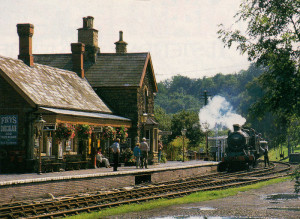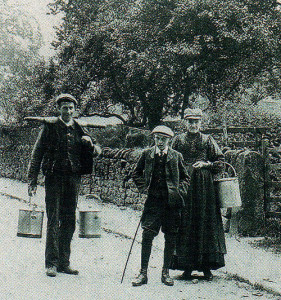
I should remember the house where I was born – I still live there 76 years later. Not much has altered, a bathroom here, two or three new fireplaces there. Before gas or electricity arrived at our village of Rowsley near Matlock in Derbyshire, we managed with just oil lamps with candles upstairs and coal fires with wood to burn.
The fire that kept the house warm, or at least one room, also baked bread and cakes as well as cooking the dinner. On the other side of the range was the ‘hot water supply’.
Mother bottled fruit, made jams, pickles and wine using produce from the large garden and apples, plums and pears from the orchard. There were eggs from the hens and sometimes ducks, and later we kept a pig. One Christmas instead of a tree, there was a Victorian style ‘kissing bunch’, a decorated holly ball hanging from the ceiling.
London-Manchester expresses raced past the house and through the village.
Summertime, the line was busy with Blackpool excursions, many from colliery districts.
Tables were loaded with bags of lunch going and presents returning.
Saturday afternoon we caught the train to the nearby town to the Picture Palace, calling for broken slab Palm toffee from the shop next door. The films were all silent, accompanied by pianist. Afterwards we walked round Peacocks’ 1d bazaar. It didn’t cost much for all of us because we had a cheap rail ticket.
It didn’t need to because money was very short as older readers will remember.

But most people were in the same boat so it didn’t really matter and, anyway, mother was a good manager. Being in the country, we lived off the land to a large extent and didn’t go short.
One day a large package arrived. Inside was a magic lantern from an uncle in Sheffield and on Sunday nights a white tablecloth would be hung on the wall, the oven door and would be drawn across the fire which had been allowed to go low, Dad would light the lamp and show the slides. Amongst the favourites was Dick Turpin’s ride to York and a set of African slides.
Eventually gas came to the village and so there were no more accumulators to be kept charged for the wireless. Dark evenings we played under one of the two gas lamps – there was no traffic. On the triangular surround of the lamp post in the square, lit by electricity from the watermill, we played ‘Puss, puss, come to my corner’. Do any readers know the game? But ‘Hide and seek’ with its variations was favourite. In the summer, we would swim in the river.
There was a telephone in the post office and I would take telegrams from there on my bicycle. Many will remember the village shops’ penny and ha’penny trays. Back in those days, we had a resident policeman and schoolmaster. The church was much better attended than today and the choir trip to Blackpool by train, the last Saturday in September, was the highlight of the year. Then the summer was over.
And this all went on until 1939 and the outbreak of World War Two.
All my life I could have thrown a stone on to the railway track from my bedroom window. It was no ordinary line either, with express trains racing through the middle of the village – St. Pancras bound one way, Manchester Central the other. There was no need for a clock, one could set the time by them. With local passenger trains carrying coal, iron ore and other freight, it was busy day and night.
Coal fell from the wagons and tenders and ended at the bottom of the garden placed there by the linesmen tidying up the track. Coins were placed on the line to be flattened by the wheels passing over them, to the disapproval and displeasure of parents.
Whether because they were being built at the same time as the Gold Rush at the end of the last century or, as is more likely, there was more money there, the railway cottages in the village were always referred to as ‘up Klondike. Of the original older railway cottages of 150 years ago, three are still in good condition and in use while two are semi-derelict.
For seven years we went to school on the train passing within yards of the house. At one time, the Midland Pullman, the ‘Blue Train’ non-stop Manchester to London (except for a businessman’s halt at Stockport), ran through the village morning and evening.
All that has gone now with the Beeching ‘axe’ of 1967, nothing left of those days -station, platforms, even bridges gone although the original ‘listed building’ station of 1849 still stands in splendid isolation.
Ronald Whitehead








